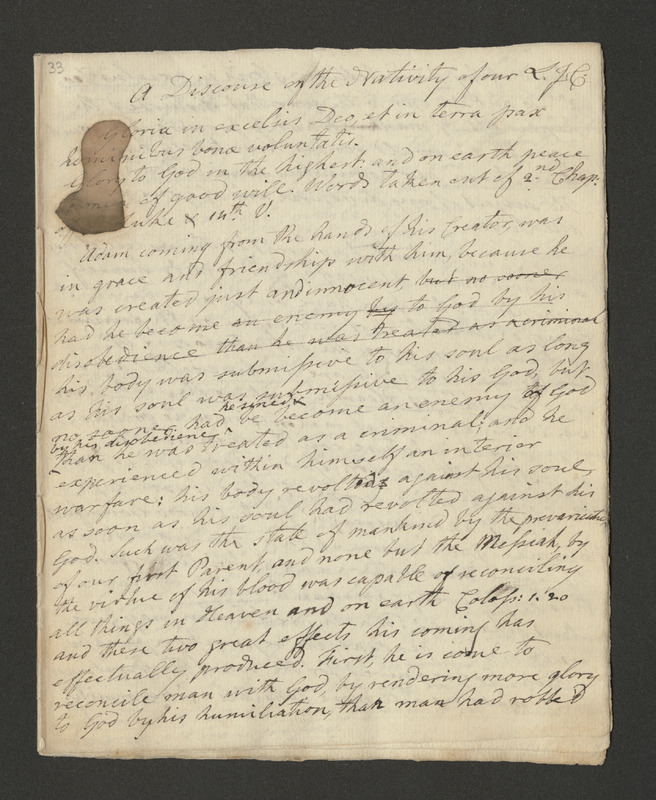James Archer sermons
The collection consists of 82 sermons written for Sundays, religious holidays, and as inducements into the religious profession. Only one sermon is dated (1788) although the watermarks on the paper run as late as 1826. The sermons are of varying length but generally run about 12 pages long. For a list of titles of the sermons see the following container list. The text of the sermons contain many corrections and revisions and appear to be intended for delivery rather than for publication although two, item 66 and item 70 in the container list appear exactly as printed in Archers published work Sermons on various Moral and Religious Subjects for All the Sundays and some of the Principal Festivals of the Year, London, 1817. The sermons reveal to the scholar the style and content of a popular English Catholic priest during the period of Roman Catholic persecution in England. Lacking dates the collection remains in the same order in which it was received. The scholar will have to decide if the order is significant.
-
 Text
TextFirst of three short discourses, all untitled, concerning candidates for a religious profession
Archer, James, 1751-1834This sermon explains the importance of renouncing both worldly pleasures and oneself when seeking a religious profession. -
 Text
TextUntitled; Ephesians 5:2. (Another version of Folder 3, Item 34)
Archer, James, 1751-1834This sermon celebrates Jesus's love and passion, describing his death, sacrifice, and suffering for humanity despite our sins and cruelty. -
 Text
TextSermon for the 4th Sunday of Lent; John 9:8-9
Archer, James, 1751-1834This sermon addresses false reports, addressing both those that make false reports and those that listen to them. -
 Text
TextSermon for the 3rd Sunday of Lent; Luke 16:22
Archer, James, 1751-1834This sermon explains the horror of Hell, describing the eternal torment and suffering of those who lead sinful lives. -
 Text
TextSermon for the 5th Sunday after Easter; John 16:23
Archer, James, 1751-1834This sermon addresses prayer, emphasizing that consistent prayer is necessary to receive salvation, but prayer must be done correctly, as in, with humility and without sin, to be fruitful. -
 Text
TextA Discourse for Sexagesima Sunday; Luke 8:11
Archer, James, 1751-1834This sermon explains the importance of ensuring that one is receptive to the word of God, describing how the word of God cannot be properly sown into a soul that is like concrete or thorns- one must be truly willing and receptive of God to reach salvation. -
 Text
TextA Discourse for the 7th Sunday after Pent.; Matthew 7: 19
Archer, James, 1751-1834This sermon examines the importance of doing good works, explaining that simply refraining from evil is not enough to be rewarded in heaven, and that even those who are sick or poor are capable of fasting, giving alms, or prayer. -
 Text
TextA Discourse for the 3rd Sunday of Lent; Luke 11:15
Archer, James, 1751-1834This sermon examines the virtue of loving your neighbor, cautioning that speaking ill of one's neighbor, and thus recklessly tainting their reputation, is a great sin as only God can judge. -
 Text
TextA Discourse for the 1st Sunday of Lent; Matthew 4:2
Archer, James, 1751-1834This sermon addresses penance and atonement, emphasizing that confessing one's sins is not sufficient to be truly penitent- one must suffer proportionally to atone for their sins. -
 Text
TextUntitled; Ephesians 5:2
Archer, James, 1751-1834This sermon celebrates Jesus's love and passion, describing his death, sacrifice, and suffering for humanity despite our sins and cruelty. -
 Text
TextOn the Passion of our L.J.C.; Ephesians 5:2
Archer, James, 1751-1834This sermon celebrates Jesus's love and passion, describing his death, sacrifice, and suffering for humanity despite our sins and cruelty. -
 Text
TextA Discourse on the Nativity of our L.J.C.; Luke 2:14
Archer, James, 1751-1834This sermon addresses the birth of Jesus, describing the original sin of Adam eating the apple and the mercy of God in sending his son to redeem humanity. -
 Text
TextSermon for the [?] Sunday of Advent; Luke 3:3
Archer, James, 1751-1834This sermon examines the practice of penance, explaining examples of Jesus's penitence and necessary qualities that distinguish one's penance as truthful. -
 Text
TextA Discourse for the 14th Sunday after Pent.; Matthew 8:24
Archer, James, 1751-1834This sermon cautions against avarice, claiming that greed turns people away from God by prioritizing worldly riches over salvation. -
 Text
TextA Clothing Discourse; Apocalypsis Ioannes 2:17
Archer, James, 1751-1834This sermon explains why people seek and study religion, stating that religious spaces serve as refuges, schools, and sanctuaries that help people to enter into Heaven. -
 Text
TextDiscourse for Palm Sunday; Matthew 21:5
Archer, James, 1751-1834This sermon cautions against accepting Jesus Christ into your heart under false pretenses, but that all good Christians must accept him fully as their Lord and give up their sinful desires. -
 Text
TextUntitled; II Corinthians 6:2
Archer, James, 1751-1834This sermon defines the Jubilee, describing when it occurs, remittances for servitude, and the forgiveness of debt. -
 Text
TextA Discourse for the Sunday within the Oct. of Corpus Christi, "On the Sacrifice of the Mass;" Luke 14: 24
Archer, James, 1751-1834This sermon examines the process of Mass, explaining the importance and proper practice of its three sections: the offertory, the consecration, and the communion. -
 Text
TextChristmas Day; Luke 2: 15 (Another version of folder 2, Item 12)
Archer, James, 1751-1834This sermon addresses the humble birth of Jesus, describing the conditions of his Birth and encouraging followers of Jesus to embody his same humility in birth by abstaining from luxury or excess. -
 Text
TextA Discourse for Christmas Day; Luke 2:10
Archer, James, 1751-1834This sermon celebrates Jesus Christ, identifying certain qualities of Jesus and emphasizing his humility as a model for Christians to follow. -
 Text
TextSermon for the 4th Sunday in Lent; John 20:23
Archer, James, 1751-1834This sermon examines the practice of confession, emphasizing the importance of revealing one's sins in order to receive forgiveness, and outlining the appropriate times in which absolution should be withheld.